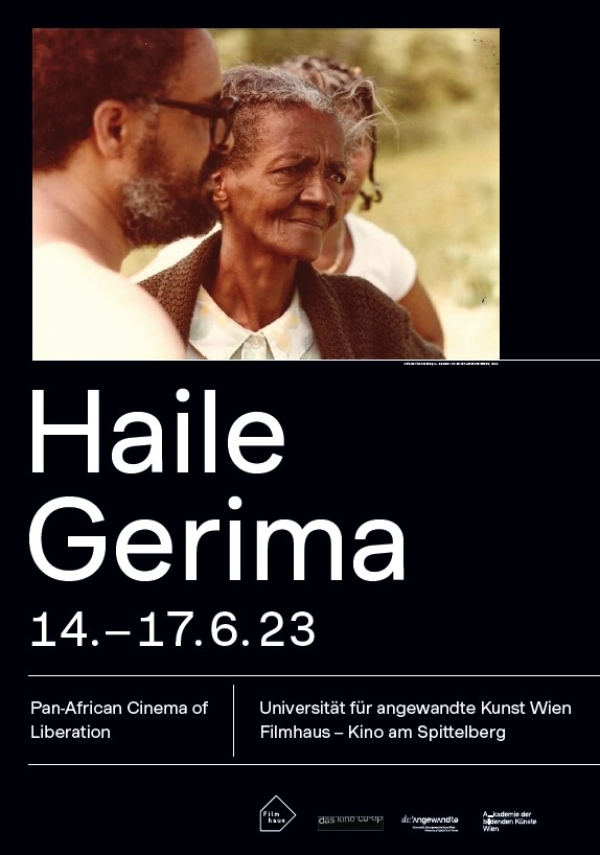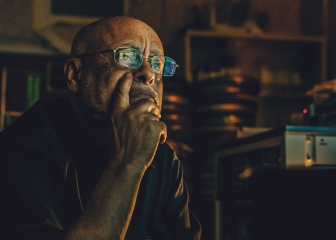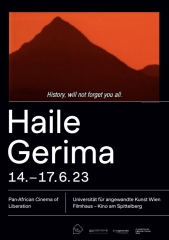Haile Gerima. Pan-African Cinema of Liberation

Haile Gerima. Pan-African Cinema of Liberation
“Past spirits summoned each other
From here and everywhere.…
Moral warrior, never waver!”
Thus are summoned the spirits of freedom and resistance waged by Ethiopian warriors in their decisive and victorious
battle against the Italian colonial invasion in March 1896. The sound of this and other rallying poem-songs structured Haile
Gerima’s film Adwa. An African Victory (1999) for a Pan-African Cinema of Liberation.
It
is a cinema of transmission and translation – of stories and histories, knowledge and its gestures as well as poems and songs.
They all summon each other and get passed on between generations and places, between images and sounds, between hands and
glances – more than a hundred years after the historic Battle of Adwa, where narration was suspended but never ended.
Today, we await the release of Gerima’s latest film Black Lions, Roman Wolves (formerly known as The Children
of Adwa: 40 Years Later), a five-and-a-half-hour documentary sequel to Adwa that documents the second Italian
invasion of Ethiopia under Mussolini’s fascist government in 1935 and, hence, another generation of Ethiopian resistance.
Black Lions is also an homage to Haile Gerima’s father, Tefeka Gerima, who – as playwright, storyteller and anti-colonial
and anti-fascist resistance fighter – had always been an inspiration and co-conspirator for Gerima’s oeuvre. This impending
film has been forty years in the making as it required a long and persistent struggle against the neocolonial archival politics
of the Luce Institute (Istituto Luce Cinecittà) which has refused to deliver the necessary footage requested by Haile
Gerima to complete this film.
Along with recent retrospectives in Los Angeles, New York and Turin, this film program
now intervenes in Vienna at a crucial moment of Gerima’s cinematographic career. It pays tribute to the steadfast journey
of one of the most outstanding and prolific, truly independent filmmaker-warriors of the African continent and the Black diaspora
worldwide. It presents a unique opportunity to preview segments of this long-awaited film, Adwa’s sequel, in addition
to work-in-progress, enabling an exclusive engagement with the filmmaker’s cinematic techniques, ethics, principles and creativity.
What’s more, the production history of Black Lions, Roman Wolves itself represents a vital
occasion to reflect on structures of narration, storytelling, power, resistance and in/justice in cinema. Perhaps most of
all, it compels us to amplify the demand for the return or liberation of archival material and the “past spirits” still held
hostage by Western imperialist institutions like Luce and so many others.
Gerima aptly notes that the right
of Black people to tell their stories is akin to the right to take breath and to live free from slavery and colonialism in
all forms, whether it is an old colonialism or neo-colonialism, chattel slavery or what was critically identified as “neo-slavery”
by George Jackson, the imprisoned Black Panther revolutionary whom Gerima names as one of his first “film teachers” along
with Frantz Fanon. The West established a legacy of colonial slavery which it actively reanimates in its own systematic interests.
Recently, a number of imperial statues and monuments have fallen all over the world; and Europe’s highbrow museums are getting
critically blasted for their arrogant and violent expropriations of art and artefacts from colonized countries. There is a
battle to be fought against the ongoing dictatorship of white-supremacist discourses of domination and the hegemonic Eurocentric
narratives of Western empire which continue to hold stories of the tricontinental “Global South” in captivity.
What
does it mean to view Gerima’s cinema as a cinema of transmission? As he himself states, each new film builds on all the previous
ones, learns from them, and remains connected to them. From his very first and rarely screened short films, Kill Tarzan
and Birth of a Nation, to stunning documentaries like Wilmington 10 – U.S.A. 10,000 (1979) and
Adwa (1999) as well as powerfully dramatic feature films like Ashes and Embers (1982), Sankofa
(1993) and Teza ("Morning Dew”, 2008), Gerima continues to oppose the dominant languages of cinema with
self-determination and the determination to reclaim his stories, those of his ancestors and the right to tell them.
Finally, Gerima’s politics of cinema go well beyond the mere screening of films and has always centrally involved community
audiences and critical activists (cf. Haile Gerima, “Triangular Cinema, Breaking Toys, and Dinknesh vs. Lucy”, 1989). Accordingly,
the film screenings of unreleased work at Filmhaus – Kino am Spittelberg will be accompanied by a lecture
by Haile Gerima, where he will give us the opportunity to see his rarely seen short films Kill Tarzan and
Birth of a Nation; a panel discussion on imperial film archives, ancestral heritage, new demands of radical
restitution or repatriation; and, furthermore, a filmmaker conversation between Haile Gerima and Felipe Peres
Calheiros on cinema and techniques of maroonage.
Program, Organizing, Text: Viktoria
Luisa Metschl, Greg Thomas
Graphic Design: Katja Hasenöhrl
This project was made possible
by the generous support of the Rectorate and the Department of Transcultural Studies of the University of Applied Arts Vienna
and Kooperative “das kino co-op”, in collaboration with the Academy of Fine Arts Vienna and Filmhaus - Kino am Spittelberg.
Special thanks to Gerald Bast, Christian Dewald, Nanna Heidenreich, Christian Kravagna.
“Cinema
of Liberation”
Public Lecture by Haile Gerima
Wednesday, June 14, 2023
6 p.m.
University of
Applied Arts Vienna
Auditorium
Vordere Zollamtstraße 7
1030 Vienna
“Everybody’s war
and conflict begins with or from a story. Who owns your story? Who tells your story?” (Haile Gerima)
This
new lecture by Haile Gerima will center on the form, content, and aesthetics of LIBERATION CINEMA, whose original objective
as of the 1960s and 70s was to aide in decolonization and effect true independence, especially for African peoples both “at
home and abroad” or on the continent and in the diaspora.
Moreover, the lecture will confront certain cultural
and political questions which are all the more urgent today, such as: How can cinema be used as a weapon to combat imperialism?
How does one empower one’s particular narrative logic? How do we construct of film audiences for partnership in liberation?
What should my cinematic accent be?
Reflecting on his earliest days in film school, Gerima recalls:
“The first revolution I had to wage was against my own colonization. Tarzan movies, John Wayne movies. So, I made a film called
Kill Tarzan. To begin to liberate myself, I had to kill Tarzan in my head.” For this new “Cinema of Liberation” lecture,
the public audience will get to see imagery from two of his recently recovered film shorts – the aforementioned Kill Tarzan
and also his own spectacular rendition of Birth of a Nation.
BLACK LIONS, ROMAN WOLVES:
“Ancestors in / and the Colonizing Archives”
Film Screening and Panel Discussion with Haile Gerima
Thursday,
June 15, 2023
5 p.m.
Filmhaus – Kino am Spittelberg
Spittelberggasse 3
1070 Vienna
*FREE
ENTRY*
Haile Gerima will present an exclusive 60 min. preview of his most recent work-in-progress Black Lions,
Roman Wolves. Afterwards, he will be in conversation with Berhanu Ashagrie Deribew (artist / Academy of Fine Arts Vienna),
Viktoria Metschl (film scholar / University of Applied Arts Vienna), Jeremy Okello-Okello (film scholar / Academy of Fine
Arts Vienna).
Introduction: Christian Kravagna (Professor of Postcolonial Studies / Academy of Fine Arts Vienna)
Moderation:
Greg Thomas (Associate professor of English / Tufts University)
Haile Gerima is one of the most widely
acclaimed and prolific filmmakers of the African continent and Black diaspora worldwide. Since the beginning of his career
in the early 1970s, emerging from a rebellious group of Black, Indigenous and international students at UCLA, the Pan-Africanist
filmmaker born in Ethiopia received countless awards and prizes. Most recently, he was honored with the Vantage Award of the
Academy Museum in Los Angeles.
At present, Haile Gerima is about to complete Black Lions, Roman
Wolves (which formerly known as The Children of Adwa, is an historic sequel to Adwa. An African Victory
(1999)), a five-hour documentary on the second Italian invasion of Ethiopia in 1935 and the Ethiopian resistance against Mussolini’s
colonial fascism. For this event, he will present a one-hour excerpt of unreleased work.
For the release
of the film has been constantly undermined by neocolonial archival politics of the Istituto Luce Cinecittà, which has refused
to satisfy Gerima’s countless requests for archival footage since the 100th anniversary of the Battle of Adwa in 1996.
How such institutions came to “possess” these materials and how they continue to exercise “ownership” over them
is a crucial matter to confront today. This panel discussion will address Haile Gerima’s three decades-long struggle to liberate
images of his ancestors held hostage in colonial archives and to obtain the rights for footage that documents Ethiopia’s brutal
invasion and occupation by the Italian army. It will also discuss examples of similar struggles for what Gerima calls the
“right to memory” of colonized peoples everywhere.
“Cinema and Maroonage”
Film screenings and Filmmaker
conversation
The Maroons (Haile Gerima, forthcoming, 60 min. excerpt)
Malunguinho (Felipe Peres Calheiros,
2013, 14’52’’)
Saturday, June 17, 2023
3 p.m.
Filmhaus – Kino am Spittelberg
Spittelberggasse 3
1070 Vienna
*FREE ENTRY*
This event is a public conversation between Haile Gerima
and Felipe Peres Calheiros on cinema and maroonage, the multidimensional technique of “collective flight and resistance” to
all sorts of enslavement.
The iconic filmmaker Haile Gerima will screen a segment of his forthcoming
film The Maroons, a continuation in documentary form of Sankofa (1993), his epic and groundbreaking dramatic feature film
on anti-slavery resistance in the Americas, preceded by the Afro-brazilian work Malunguinho (2013) by filmmaker, photographer
and journalist Felipe Peres Calheiros.
Malunguinho, an explosive short film named after a legendary
Maroon leader of Black anti-colonialist forces near the Brazilian city of Recife, is a wildly creative meditation on history,
ancestral memory and contemporary Black liberation movements. As a cinematic project, it was born out of a relationship between
local political activists and African-based religions in the Brazilian state of Pernambuco.
After the screenings, these
two works and these filmmakers will be in conversation to discuss cinema and maroonage, that is, what it means to create work
on “collective flight and resistance” to slavery and neo-slavery for the African world.






